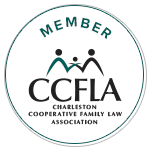Follow Us x
Frequently Asked Questions
1. Can one attorney/mediator represent both me and my spouse in Family Court?
No. In South Carolina, an attorney may represent only one party in Family Court matters involving separation/custody/divorce. Mediators are neutrals, so a mediator can facilitate and draft agreements, but may not represent either party.
2. What's the difference between Mediation and Cooperative/Collaborative Law?
- Both Mediation and Cooperative/Collaborative Law are non-litigious alternatives to the traditional system of courtroom resolution. They are generally much less stressful, time consuming and costly than going to Court.
- A mediator serves as a neutral facilitator, not representing either party. This means that she can not give legal advice to either party and can not assist the parties in getting the Court to approve their Agreement.
- Cooperative Law is a process that begins with an agreement to negotiate a settlement rather than fight in court. The Cooperative Lawyer advises her client and advocates for her client's interests through the course of negotiating and finalizing an Agreement.
- Collaborative Law is a more formalized version of Cooperative Law, with internationally recognized procedures, but Collaborative Law is not currently practiced in the Charleston, SC area.
3. Which is cheaper: Mediation or Cooperative Law?
- It depends on the parties and the issues involved. We charge an initial retainer fee (that is placed in an escrow account) and bill by the hour for our services. If an Agreement is reached quickly, the cost for Mediation and Cooperative law is often similar. If there are two Cooperative attorneys involved --which is generally recommended-- or if the issues are very complex in a mediated case, the cost will increase.
- Our initial retainer fee is quoted after the initial consult with an estimate of whether that amount is likely to cover the entire process, but it is only an estimate. Sometimes, if cases become more time-consuming than anticipated, additional fees will be needed. Other times, cases finish up with a balance that is then refunded to clients.
4. Is it possible to use mediation or Cooperative Law even if my spouse doesn't want to participate in the process?
No. Unfortunately, this is a process that requires both parties to participate.
5. What does the "one year separation" requirement mean?
- Under South Carolina law, divorce may be granted on a "fault" basis within three months of filing, or without fault after one year of the parties living separate and apart. This means that the parties must live in separate units (not just separate bedrooms) for at least one year prior to the divorce being granted. The majority of divorces in South Carolina are granted based on "one year's separation" rather than on a fault ground.
- When proceeding with a "no-fault" divorce based on one year's separation, many people choose to create Marital Separation Agreements ("MSAs") even before they physically separate, so that they can be assured that the details (both financial and parenting) are agreed upon in advance. These MSAs can be presented to the Court for approval immediately upon separation, providing peace of mind for the parties that the most challenging part of the legal process is behind them. Then, after the one-year separation, it's simple to obtain the divorce by presenting the previously-court-approved MSA plus brief testimony establishing the 12+ months of separation.


